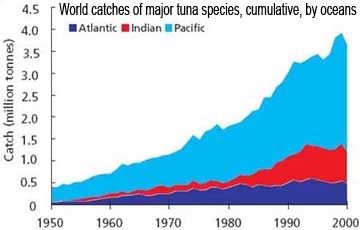Greenpeace has ranked the canned tuna corporation Princes as the most environmentally damaging tuna brand in the U.K., citing that the Japanese company uses destructive fishing methods and that its claims of sustainability are blatantly untrue.
Other reasons for Princes’ poor rating include its failure to label its cans with species or origin, its inclusion of overfished species such as bigeye and yellowfin tuna, and the lack of reliable figures to support its claims that 25% of products are caught using sustainable methods.
Tuna stocks around the globe are becoming depleted at an alarming rate, due mainly to Japan’s insatiable appetite for sashimi. Unlike sashimi, canned tuna often gets a green light from conservation organizations because if relies on tuna species – namely, skipjack and albacore – which are relatively abundant. However, that green light is contingent on the companies’ use of certain fishing methods which mitigate the bycatch of protected species and juvenile fish stock.
While selective techniques such as line and pole fishing have been deemed sustainable, many canned tuna companies continue to use bycatch-heavy FAD-assisted purse seining. FADs (fish aggregating devices) are floating structures which are set in the ocean by fishing companies to attract schools of tuna. Unfortunately, they also attract sharks, turtles, marine mammals, and other fish species which are indiscriminately scooped up and killed when the purse seiner returns.
 Skipjack is a species frequently used for canned tuna. This skipjack was caught by a longline vessel which uses a fishing method that’s more environmentally friendly than seining. Photo by mongabay.com |
Some canned tuna companies employ line and pole fishing methods while others continue to catch their fish through destructive means. Consumers often rely on labels to tell them whether or not the tuna inside the can was sustainably fished, but in some cases that information may be inaccurate.
Princes, for instance, is one of the most popular canned tuna brands in the United Kingdom, a country second only to the U.S. as the biggest consumer of canned tuna in the world. Statements printed on Princes cans in the U.K. say that “Princes is fully committed to fishing methods which protect the marine environment and its species.”
However, Greenpeace has revealed this claim to be false.
“Endangered sharks and other species are killed every year while catching tuna to be put in tins. And, despite the hugely misleading claims on their cans, Princes are the worst of the lot.” said David Ritter, Greenpeace UK Oceans Campaign manager. “It’s time for Princes to follow other industry leaders and stop selling tuna caught using methods which cause the deaths of sharks and many other marine animals,”
In November, Greenpeace published a statement announcing that genetic analysis conducted on canned tuna from twelve countries found “numerous inconsistencies”, including species-mixture in some cans. These inconsistencies are considered to be side-effects of the use of FADs.
“Tuna companies are indiscriminately stuffing multiple species of tuna, including juveniles of species in decline, into tins that shoppers rightfully expect to contain a sustainable product,” said Nina Thuellen, Greenpeace oceans campaigner. “Retailers must act now to immediately shift their business away from cheap tuna caught using FADs with purse-seine nets and source from pole-and-line or FAD-free purse-seined tuna instead.”
In total, Greenpeace surveyed the eight major U.K. canned tuna brands and ranked them according to sustainability. Continuing its reign at the top is Sainsbury’s which is tied this year with Marks and Spencer.
The summary of the Greenpeace U.K. Tuna League Table 2011:
1st – Sainsbury’s, Marks and Spencer
2nd – Waitrose
3rd – Cooperative
4th – Tesco
5th – ASDA
6th – Morrison’s
7th – John West
8th – Princes
To learn more, go to
http://www.greenpeace.org.uk/tunaleaguetable
Related articles
Sainsbury’s has the most sustainable tuna, John West the least

(08/13/2008) To aid concerned tuna-lovers, Greenpeace has ranked eight of the top canned tuna retailers in order from most sustainable to least. Canned tuna from John West, the biggest retailer of tuna in the UK, proves to be the worst of the lot, whereas Sainsbury’s is the most environmentally-friendly. In a press release Greenpeace said that Sainsbury’s is “the only tinned tuna brand that is fished using sustainable methods”.







